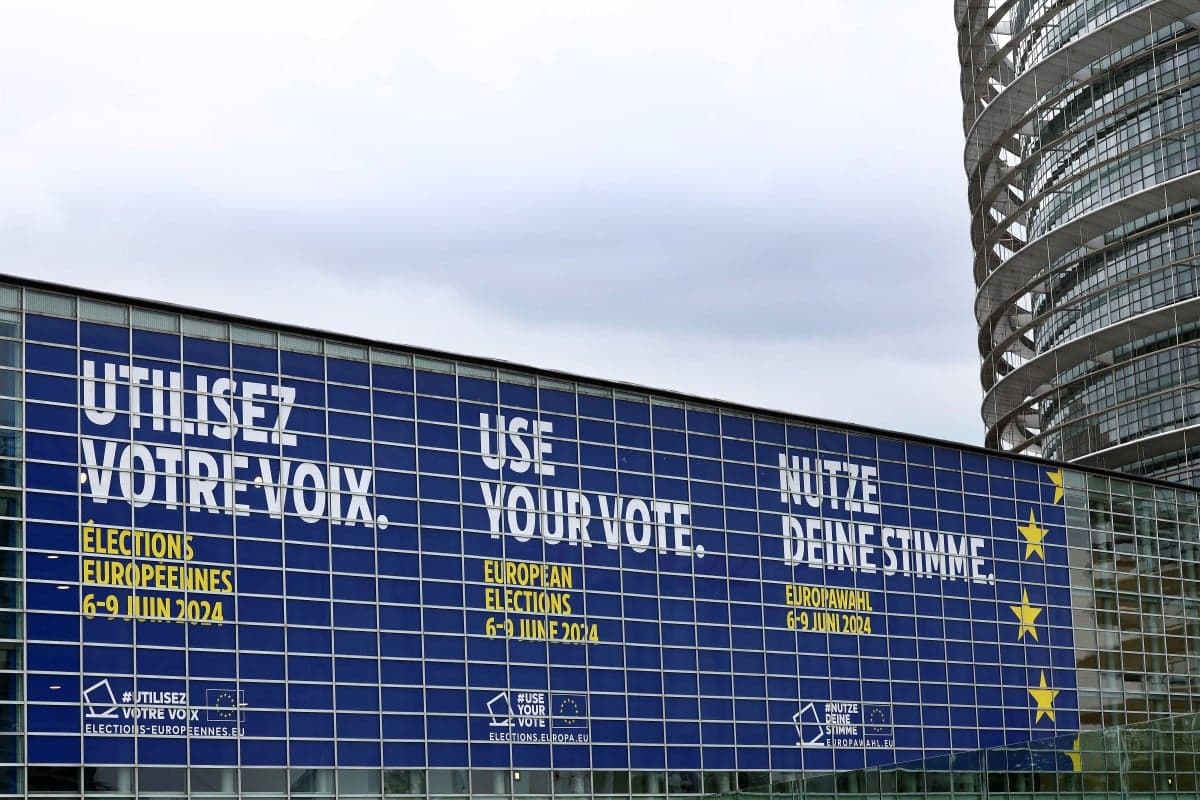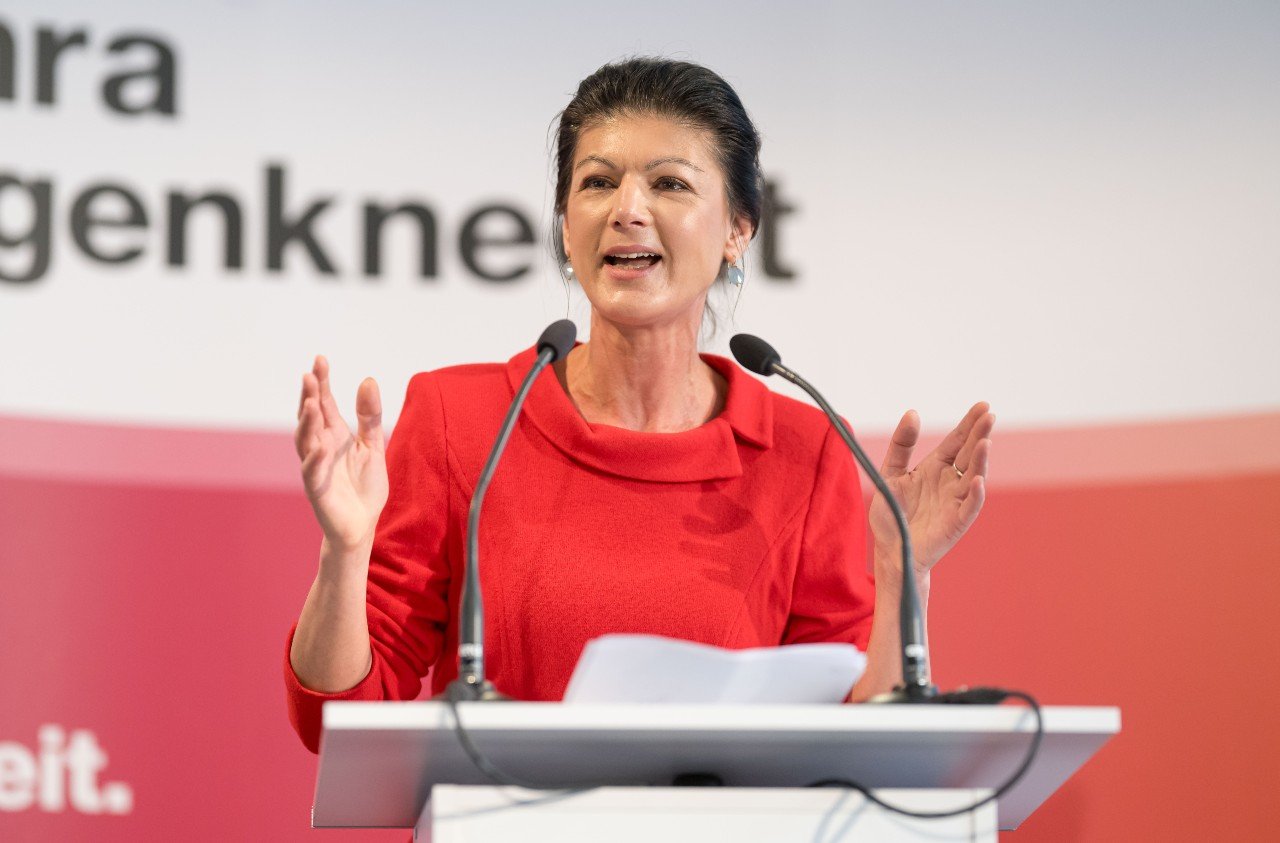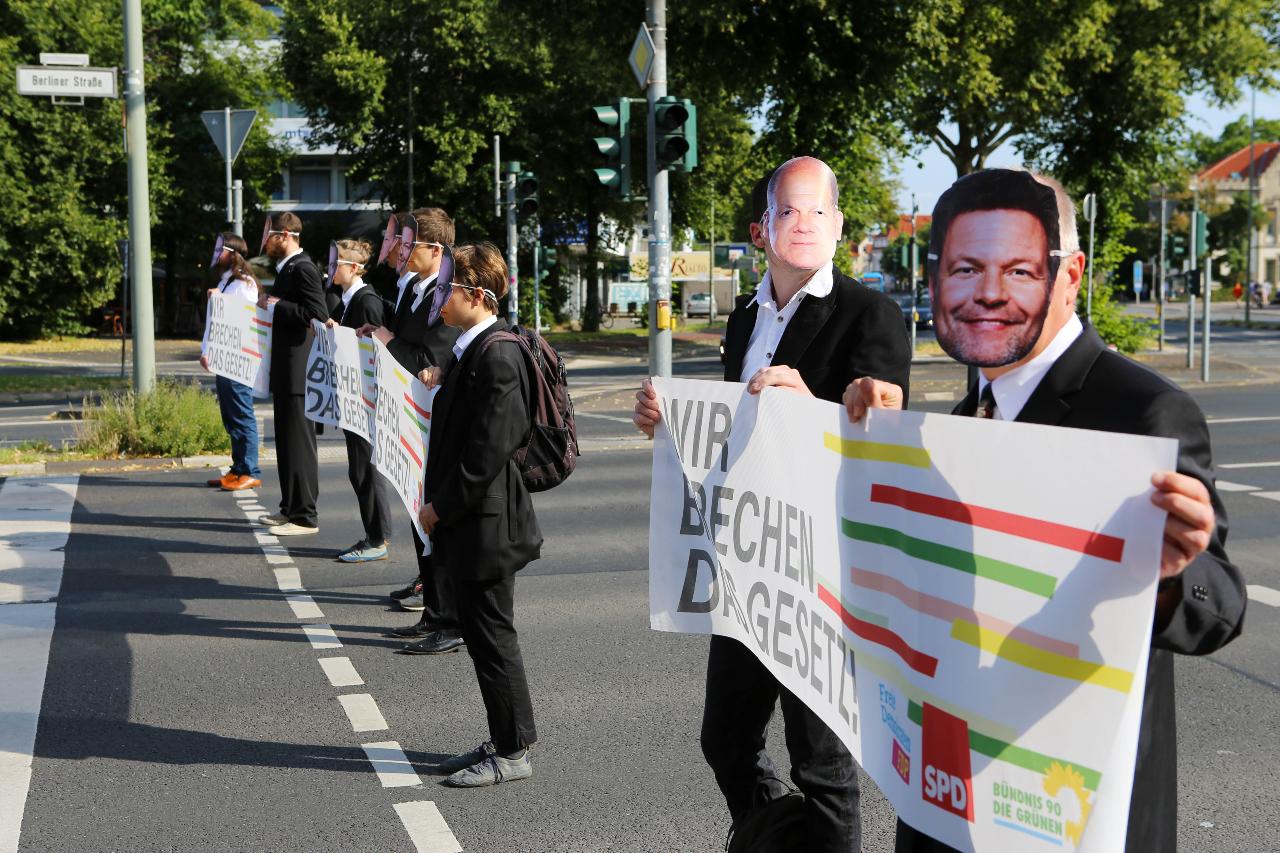Who are Germany's newest parties running in the EU elections?

There are 34 political parties in Germany officially running for seats in the European Parliament in the election to take place on June 9th. Here’s a list of some of the lesser-known parties and what they’re about.
European citizens have a chance to shape Europe’s next parliament by voting in the next EU election, which takes place from June 6th to the 9th.
But with a total of 34 political parties in Germany vying for parliamentary seats, the selection process can be a bit overwhelming.
Of the 34 parties that EU citizens based in Germany can choose from, nine are brand new to the ballot this year – meaning they did not exist during the last European elections in 2019.
Here’s a look at Germany’s newest European political parties, and what issues they are campaigning on:
Sahra Wagenknecht Alliance - Bündnis Sahra Wagenknecht (BSW)
Top candidate: Fabio De Masi
Named for its leader, Sarah Wagenknecht, Bündnis Sahra Wagenknecht (BSW) began to come together in September 2023 after Wagenknecht parted ways with Germany’s Left party.
Wagenknecht started the party by bringing along a collection of other former Left party members – ten of them current German parliament members.

Sahra Wagenknecht introduces her new party, the Sahra Wagenknecht Alliance, at a press conference in Passau, Bavaria. Photo: picture alliance/dpa | Lukas Barth
According to a feature report on Wagenknecht in Spiegel, the party aims to appeal to voters, “who no longer feel heard…who are against the focus on gendering and for the expropriation of housing corporations, against arms deliveries to Ukraine and an open refugee policy, for nationwide collective agreements and a liberal corona policy.”
These views have led some to describe the party as left-wing nationalist or left-wing populist - and even pro-Russian.
Citizens for Justice Action - Aktion Bürger für Gerechtigkeit (ABG)
Top candidate: Loreen Bermuske
According to reporting by Tagesschau, Citizens for Justice Action, “does not assign itself to any political camp, but represents right-wing nationalist and anti-EU positions.”
The party’s right-wing policies come into focus as you read through the party platform as described on their website: the party would like to see Germany tighten its borders and withdraw from the EU.
On the topic of German identity and culture, the party suggests that, “The German past often prevents us from recognizing and appreciating our German identity”. They suggest that German citizenship be based on the principle of ‘German descent’, and advocate for a withdrawal of birthplace citizenship, which currently allows for some born in Germany to be German citizens.
READ ALSO: 10 things you should know about the European Parliamentary elections
Climate List Germany - Klimaliste
Top candidate: Verena Hofmann
As the name implies, Climate List is a party concerned first and foremost with environmental protections.
Led by a 26-year-old psychologist, Climate List brings a five-point platform to their EU election campaign:
- Europe is to be climate-neutral by 2030 at the latest.
- Compliance with the 1.5 degree limit.
- Consistent species protection through the ban on glyphosate, more fallow land, reduction of fishing quotas, measures against light pollution and bird strikes, education, hunting and fishing bans, among other things.
- Complete abolition of all animal experiments, replacement by methods without animal suffering.
- A welcoming culture, fair asylum procedures within the borders of the EU, no repatriation agreements with racist autocracies
Democratic Alliance for Diversity and Awakening - Demokratische Allianz für Vielfalt und Aufbruch (DAVA)
Top candidate: Fatih Zingal
Founded at the beginning of 2024, the Democratic Alliance for Diversity and Awakening campaigns on a goal of promoting the rights of foreign nationals in Germany, with a particular focus on Muslim immigrants.

Fatih Zingal (left) appears on an episode of German talk show Hart Aber Fair in 2017. Photo: picture alliance / Oliver Ziebe/WDR/dpa | Oliver Ziebe
On the party’s website, they promote democratic values such as diversity, transparency and fairness, and equality and inclusion, for example.
But the party and its leaders have been criticised by politicians from the CDU, SPD and Greens, who suggest that it is closely tied to the Turkish ruling party AKP, which is the party of Turkish President Erdoğan.
Grassroots Democratic Party of Germany - Basisdemokratische Partei Deutschland (die Basis)
Top candidate: Ellèn Hölzer
The Grassroots Democratic Party of Germany says it aims to strengthen grassroots movements, claiming that too many areas of personal life are negatively affected by economic interests, profits, and politics.
The party’s primary focus early on was opposition to Covid restrictions, and reporting on the party linked many of its members to the "Querdenken" movement – an anti-lockdown and anti-vaccination movement in Germany.
READ ALSO: European elections - The 5 numbers you need to understand the EU
Last Generation - Letzte Generation
Top candidates: Lina Johnsen and Theodor Schnarr
The direct action group now infamous for road blockades and throwing soup at art to generate attention for climate issues has formed a political party to join in the EU elections.

Climate activists from Last Generation block a street in Göttingen, Lower Saxony. Photo: picture alliance/dpa | Stefan Rampfel
Top candidate Johnsen says on the group’s website that she is running, “because we need fundamental systemic change: away from fossil fuels to socially just [system]”.
Last Generation’s proclivity for disruptive actions like road blockades have made the group particularly contentious in Germany. Police raids against the group were carried out in 2023, and their website was temporarily shut down on the instruction of the prosecutor’s office.
Party of Reason - Partei der Vernunft (PDV)
Top candidate: Dirk Hesse
The Party of Reason, founded in 2009 by Oliver Janich, campaigns for libertarian positions such as a minimal state and free markets. The party also denies the reality of human-caused climate change.
According to the party’s website, their fundamental program is focused primarily on self-responsibility and personal freedom.
Party of Progress - Partei des Fortschritts (PdF)
Top candidate: Lukas Sieper
The Party of Progress (PdF), founded in 2020 in Cologne, is a pro-European party that wants to promote European integration by expanding and developing further EU institutions.
The party pledges strong commitments to the German Basic Law, the EU and international law. The party also supports the creation of a European army, to be built up in addition to current national armed forces.
The party’s lead candidates are primarily young men, including a 27 year-old lawyer as the top candidate.
V Party, or Party for Change, Vegetarians and Vegans - Partei für Veränderung, Vegetarier und Veganer
Top candidate: Simon Klopstock
The name really gives it away here – the Party for Change, Vegetarians and Vegans primarily aims for a more widespread adoption of plant-based diets. On the party’s website they make a case for why dietary change is directly related to environmental issues as well as social issues and health protection.
As for other kinds of change, the party supports encouraging more ecological transportation such as through further bike use and setting speed limits for cars. The party would like to see more renewable energy and supports the idea of implementing a universal basic income.
READ ALSO: INTERVIEW - How universal basic income could benefit Germany
Comments
See Also
European citizens have a chance to shape Europe’s next parliament by voting in the next EU election, which takes place from June 6th to the 9th.
But with a total of 34 political parties in Germany vying for parliamentary seats, the selection process can be a bit overwhelming.
Of the 34 parties that EU citizens based in Germany can choose from, nine are brand new to the ballot this year – meaning they did not exist during the last European elections in 2019.
Here’s a look at Germany’s newest European political parties, and what issues they are campaigning on:
Sahra Wagenknecht Alliance - Bündnis Sahra Wagenknecht (BSW)
Top candidate: Fabio De Masi
Named for its leader, Sarah Wagenknecht, Bündnis Sahra Wagenknecht (BSW) began to come together in September 2023 after Wagenknecht parted ways with Germany’s Left party.
Wagenknecht started the party by bringing along a collection of other former Left party members – ten of them current German parliament members.

According to a feature report on Wagenknecht in Spiegel, the party aims to appeal to voters, “who no longer feel heard…who are against the focus on gendering and for the expropriation of housing corporations, against arms deliveries to Ukraine and an open refugee policy, for nationwide collective agreements and a liberal corona policy.”
These views have led some to describe the party as left-wing nationalist or left-wing populist - and even pro-Russian.
Citizens for Justice Action - Aktion Bürger für Gerechtigkeit (ABG)
Top candidate: Loreen Bermuske
According to reporting by Tagesschau, Citizens for Justice Action, “does not assign itself to any political camp, but represents right-wing nationalist and anti-EU positions.”
The party’s right-wing policies come into focus as you read through the party platform as described on their website: the party would like to see Germany tighten its borders and withdraw from the EU.
On the topic of German identity and culture, the party suggests that, “The German past often prevents us from recognizing and appreciating our German identity”. They suggest that German citizenship be based on the principle of ‘German descent’, and advocate for a withdrawal of birthplace citizenship, which currently allows for some born in Germany to be German citizens.
READ ALSO: 10 things you should know about the European Parliamentary elections
Climate List Germany - Klimaliste
Top candidate: Verena Hofmann
As the name implies, Climate List is a party concerned first and foremost with environmental protections.
Led by a 26-year-old psychologist, Climate List brings a five-point platform to their EU election campaign:
- Europe is to be climate-neutral by 2030 at the latest.
- Compliance with the 1.5 degree limit.
- Consistent species protection through the ban on glyphosate, more fallow land, reduction of fishing quotas, measures against light pollution and bird strikes, education, hunting and fishing bans, among other things.
- Complete abolition of all animal experiments, replacement by methods without animal suffering.
- A welcoming culture, fair asylum procedures within the borders of the EU, no repatriation agreements with racist autocracies
Democratic Alliance for Diversity and Awakening - Demokratische Allianz für Vielfalt und Aufbruch (DAVA)
Top candidate: Fatih Zingal
Founded at the beginning of 2024, the Democratic Alliance for Diversity and Awakening campaigns on a goal of promoting the rights of foreign nationals in Germany, with a particular focus on Muslim immigrants.

On the party’s website, they promote democratic values such as diversity, transparency and fairness, and equality and inclusion, for example.
But the party and its leaders have been criticised by politicians from the CDU, SPD and Greens, who suggest that it is closely tied to the Turkish ruling party AKP, which is the party of Turkish President Erdoğan.
Grassroots Democratic Party of Germany - Basisdemokratische Partei Deutschland (die Basis)
Top candidate: Ellèn Hölzer
The Grassroots Democratic Party of Germany says it aims to strengthen grassroots movements, claiming that too many areas of personal life are negatively affected by economic interests, profits, and politics.
The party’s primary focus early on was opposition to Covid restrictions, and reporting on the party linked many of its members to the "Querdenken" movement – an anti-lockdown and anti-vaccination movement in Germany.
READ ALSO: European elections - The 5 numbers you need to understand the EU
Last Generation - Letzte Generation
Top candidates: Lina Johnsen and Theodor Schnarr
The direct action group now infamous for road blockades and throwing soup at art to generate attention for climate issues has formed a political party to join in the EU elections.

Top candidate Johnsen says on the group’s website that she is running, “because we need fundamental systemic change: away from fossil fuels to socially just [system]”.
Last Generation’s proclivity for disruptive actions like road blockades have made the group particularly contentious in Germany. Police raids against the group were carried out in 2023, and their website was temporarily shut down on the instruction of the prosecutor’s office.
Party of Reason - Partei der Vernunft (PDV)
Top candidate: Dirk Hesse
The Party of Reason, founded in 2009 by Oliver Janich, campaigns for libertarian positions such as a minimal state and free markets. The party also denies the reality of human-caused climate change.
According to the party’s website, their fundamental program is focused primarily on self-responsibility and personal freedom.
Party of Progress - Partei des Fortschritts (PdF)
Top candidate: Lukas Sieper
The Party of Progress (PdF), founded in 2020 in Cologne, is a pro-European party that wants to promote European integration by expanding and developing further EU institutions.
The party pledges strong commitments to the German Basic Law, the EU and international law. The party also supports the creation of a European army, to be built up in addition to current national armed forces.
The party’s lead candidates are primarily young men, including a 27 year-old lawyer as the top candidate.
V Party, or Party for Change, Vegetarians and Vegans - Partei für Veränderung, Vegetarier und Veganer
Top candidate: Simon Klopstock
The name really gives it away here – the Party for Change, Vegetarians and Vegans primarily aims for a more widespread adoption of plant-based diets. On the party’s website they make a case for why dietary change is directly related to environmental issues as well as social issues and health protection.
As for other kinds of change, the party supports encouraging more ecological transportation such as through further bike use and setting speed limits for cars. The party would like to see more renewable energy and supports the idea of implementing a universal basic income.
READ ALSO: INTERVIEW - How universal basic income could benefit Germany
Join the conversation in our comments section below. Share your own views and experience and if you have a question or suggestion for our journalists then email us at [email protected].
Please keep comments civil, constructive and on topic – and make sure to read our terms of use before getting involved.
Please log in here to leave a comment.